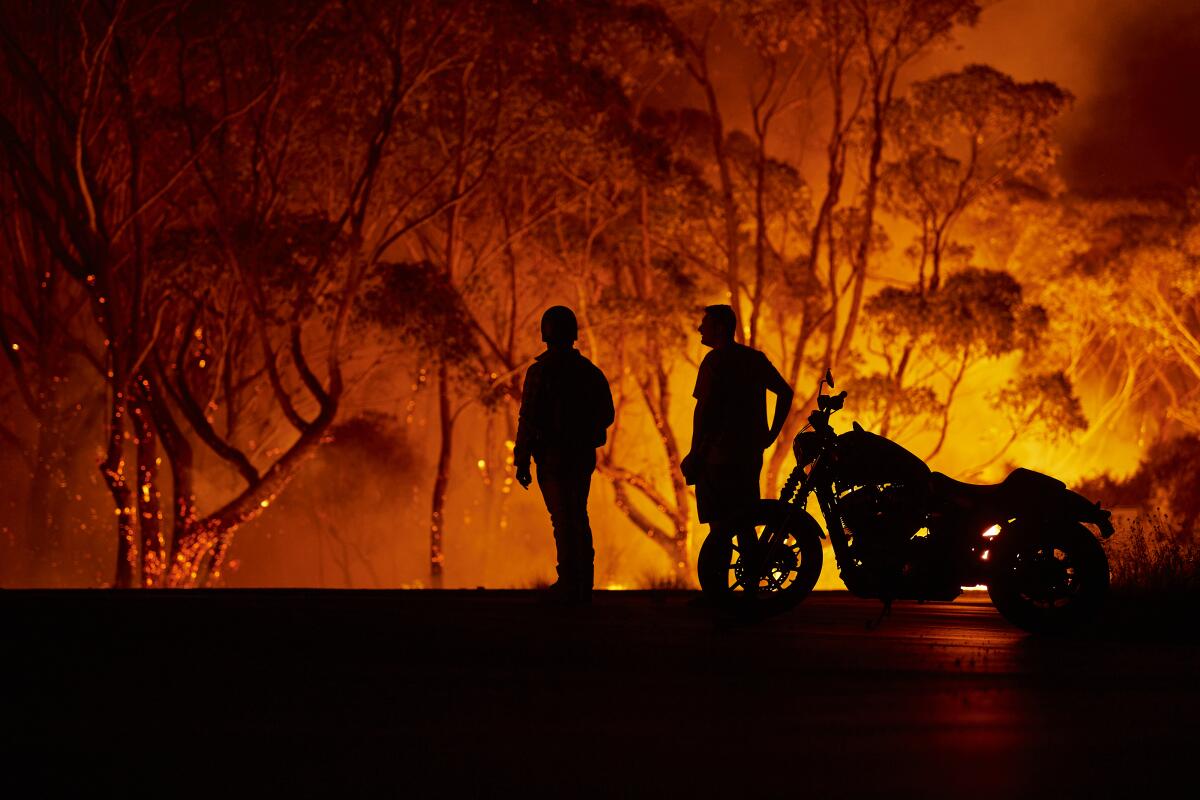In Australia’s raging bushfires, a climate-change warning to its leaders — and ours

- Share via
With more than 14 million acres in Australia blackened by bushfires, climate change is a glaring threat to Australians — and to the standing of their prime minister, Scott Morrison.
Distressed residents in fire-ravaged towns have rebuffed his handshakes and heckled his entourage. The nation’s capital, Canberra, rang in 2020 with the world’s worst air quality, causing airline cancellations and government office closures. Beach evacuations of stranded residents cornered between flames and sea now rank as Australia’s largest-ever peacetime maritime rescue operation.
U.S. firefighters feel kinship with their Australian brothers and sisters, and more than 100 have been dispatched to battle the blazes Down Under. While Americans are no strangers to wildfires, Washington would do well to note how Australia’s climate policies are entwined with this current crisis.
In 2000, an Australian parliamentary committee report acknowledged the country’s per capita carbon emissions were the highest in the world and highlighted the country’s acute climatic vulnerability. A 2013 report by the Climate Council, an independent Australian nonprofit, pointed to the increasing likelihood of high fire danger weather due to spiking temperatures, drought conditions and longer and more frequent heatwaves.
And in a November poll, 60% of Australians said they believed the country should be doing more to combat climate change.
But Australia’s reigning politicians have been deaf to these signals.
Greg Mullins, a former fire commissioner in the Australian state of New South Wales, recently told National Public Radio that the national government has been “missing in action in terms of leadership” and that Morrison “does not have his finger on the pulse of the nation.”
Morrison gleefully wielded a fist-sized chunk of coal on the floor of Parliament in 2017. A year and a half later, his right-wing party — incensed over proposed legislation that would have instituted energy sector emissions targets — ousted his predecessor and made fossil-fuel-friendly Morrison head of state.
Australian journalist Hugh Riminton has lamented the coal lobby’s grip on Canberra, calling his country “a burning nation led by cowards.” Tasmanian novelist Richard Flanagan compared the rabid bushfires to the Chernobyl nuclear disaster — another environmental catastrophe that foretold the demise of the existing, untenable political order — and likened Morrison and his “criminal course of inaction” to the decadent and disconnected Roman emperor Nero, who is famously said to have played a fiddle while flames leveled most of ancient Rome.
These domestic denunciations square with the persistent criticism of Australia from its regional neighbors. Pacific island countries are markedly vulnerable to climate change on account of sea level rise, ecosystem collapse due to ocean acidification and coral bleaching, and saltwater contamination of freshwater wells.
Enele Sopoaga, former prime minister of Tuvalu in Polynesia, scoffed at Canberra’s highly publicized Pacific Step-Up diplomatic initiative, which offers generous infrastructure financing, a work-visa program and new undersea communications cables “while you keep pouring your coal emissions into the atmosphere … and drowning my people into the water.” An official in Palau, 600 miles east of the Philippines, called Australia an “abusive spouse” that provides aid for climate mitigation projects while refusing to adopt meaningful emissions reductions.
Prior to the annual conclave of leaders at last year’s Pacific Islands Forum in Tuvalu, Rev. James Bhagwan pointedly reminded Australia’s prime minister that “he is setting foot in a country that could soon be under water.” The headline on his Sydney Morning Herald commentary said it all: “A climate plea to Scott Morrison from a churchman of the Pacific’s sinking nations.”
“No leader who claims Christian morality can allow this conduct on their watch,” Bhagwan wrote.
Present U.S. policy could benefit from such soul-searching. The White House’s abandonment of emissions targets — and combative legal action against states such as California that pursue their own fuel efficiency requirements or carbon cap-and-trade programs — demonstrate either complete obliviousness or categorical insensitivity to those affected by climate change.
For Morrison, the wrath of a traumatized Australian electorate may become evident at the ballot box. In the United States, legislators who acquiesce to how the Trump administration is undermining the 2015 Paris climate agreement and discouraging state-level climate initiatives could find themselves indicted during campaign season and punished at the polls for their dereliction and inaction.
Climate policy negligence will also undermine U.S. relations with Pacific island states.
Morrison’s “utterly tone deaf” defense of robust coal exports during the most recent Pacific Islands Forum meant Australia “upset its friends, opened the door further to China, and trashed its global reputation,” former Australian Prime Minister Kevin Rudd wrote last fall.
American climate policy requires a course correction, or it’s only a matter of time until the U.S. is pilloried in the strategically essential Pacific, leaving an influence vacuum for opportunistic Beijing. China is all too happy to tout itself as one of the first countries to sign the Paris agreement and to reiterate its pledge of stabilizing its carbon emissions over the next decade.
A heart-wrenching image of a charred juvenile kangaroo trapped against barbed wire captured the devastation of Australia’s bushfires and the bitterness of climate inaction. Distraught onlookers around the world took note. We can only hope that U.S. leaders did too.
Evan Karlik is a lieutenant commander in the U.S. Navy and an affiliate at Georgetown University’s Center for Australian, New Zealand and Pacific Studies. In 2018 he served as a defense fellow in the House of Representatives.
More to Read
A cure for the common opinion
Get thought-provoking perspectives with our weekly newsletter.
You may occasionally receive promotional content from the Los Angeles Times.






